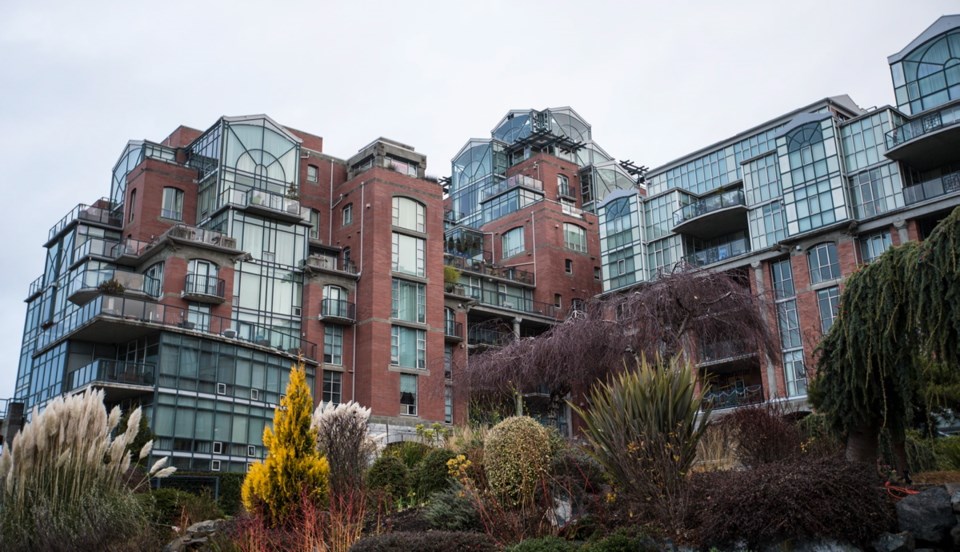The condo insurance crisis that has gripped thousands of B.C. residents hasn’t fully engulfed Greater Victoria. But where the crisis has struck, it has hit hard.
The Shoal Point condominium complex on Dallas Road appears to be the worst local example so far of the runaway premium hikes.
It cost $265,000 to insure the luxury harbourside building in James Bay last year. This year, the bill is $817,000, according to a resident with knowledge of the issue. There are more than 150 units in the 20-year-old complex and the resident’s condo fee is going up 44% this year to more than $1,000 a month in order to cover the extra costs.
As well, the deductible for water damage — which is the main driver of the crisis — is going to $500,000 from $25,000.
The building happens to be in the riding of Finance Minister Carole James, who has heard numerous similar shocking stories as the crisis arrived at the legislature this month. Industry observers have noted that large new luxury buildings are often getting hit harder than most around B.C.
So far, Shoal Point appears to be an outlier in Greater Victoria. A property management firm estimated that most buildings are seeing far smaller rate increases. They’re in the 20% to 80% range, which is problematic for many strata councils, but manageable.
Strata councils who learn that their insurance rates are “only” going to go up 20% or 30% this year are heaving sighs of relief, said an official with the firm.
The issue is so acute in Metro Vancouver that a small number of buildings have been unable to buy any insurance. That’s technically illegal, as strata councils are required to carry insurance.
All Victoria buildings to date have been able to buy insurance.
James again told reporters Wednesday that the government is aware of the problem and studying options. But the government doesn’t have many.
There are a series of reasons being offered for the dramatic increases. As noted here earlier, major reinsurers are hiking rates to cover catastrophic damage around the globe.
Some insurers are opting out of the strata market, meaning less competition.
Locally, construction costs are rising, meaning repairs are more expensive. Buildings have more amenities, which hike replacement costs. Some stratas are careless about budgeting for maintenance, meaning there are more claims and they’re more expensive.
And insurance is a relatively volatile product as costs ebb and flow over the years, although never to this extent.
Opposition B.C. Liberals suggested some measures by way of a private bill that would provide more notice of hikes, and create a water-damage prevention program.
But they wouldn’t have much immediate impact on the financial crises playing out at some strata councils.
The insurance industry, under fire from alarmed customers, has responded with some recommendations.
It wants mandatory household insurance for all residents’ units, as opposed to the building. That would offload some claims onto individuals.
It wants more stringent requirements for prevention technology, such as water sensors, flow meters and shut-off valves.
Also recommended is heightened discipline around capital repair and replacement budgets of stratas.
The biggest changes urged are a cap on payouts for losses and a bare-bones legal definition of a condo unit. That would reduce risk exposure to just the structural components in a dwelling. Amenities and finishings would be the responsibility of the unit owner to insure.
B.C. insurance brokers said this month that clarity on exactly what is and isn’t insured would “start the journey back to stability for the strata insurance market.”
B.C. charges a 4.4% tax on insurance, which the insurer pays to government upon sale of a premium. Adjusting that would make a marginal difference, but there’s no way to ensure it would be passed to consumers.
There are a number of outstanding questions. The two biggest are how an essential-service industry facing challenges that were growing incrementally decided to hike fees astronomically, all at once.
And what the provincial government can do to make much of a difference.



